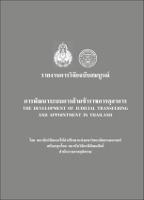การพัฒนาระบบการย้ายข้าราชการตุลาการ
by สุพิณ เกชาคุปต์; อินทิรา ฉิวรมย์; ฐนันดร์ศักดิ์ บวรนันทกุล
| การพัฒนาระบบการย้ายข้าราชการตุลาการ | |
| สุพิณ เกชาคุปต์
อินทิรา ฉิวรมย์ ฐนันดร์ศักดิ์ บวรนันทกุล |
|
| สำนักงานศูนย์วิจัยและให้คำปรึกษาแห่งมหาวิทยาลัยธรรมศาสตร์ | |
| 2010 | |
| สำนักงานศูนย์วิจัยและให้คำปรึกษาแห่งมหาวิทยาลัยธรรมศาสตร์ | |
|
The main objectives of this research are to explore the existing system and criteria of judicial transferring and a ppointment in Thailand, to survey the opinion of the judges toward them
and their suggestions, and to provide recommendations for strengthening the judicial appointment
system. Three hundred and eighty five judges who work in the various Court of Justice (excluding
assistant judges) and all senior judges who work in all courts across the country were selected as
sample of the study. Data were collected by questionnaire and structural interview as guidelines, as
well as method of focus group discussion. The result from the study was presented to stakeholders
in a public forum for critiques and suggestions as correction, improvement, and amendment as
well.
The result of the study reveals that the present judicial transferring and appointment system
which behold by the seniority principle is right and congruence to the core value of the Institution,
and highly accepted by all the judges. However, some new criteria may be added in order to
respond to the changes of working conditions and other social environment. Positions of Judges in the Special Courts and those in the three southern border provinces Courts as well as the
administrative positions should add the needed competencies qualifications and specific personal
characteristics that are suitable for job. Also some incentives should be considered to give to the
high risk positions that occur in the southern border provinces and other critical areas. To increase
the moral and fairness of the high burden and high responsibility positions in some courts, the
rearrangement of case workload and other incentives would be good. To use performance
evaluation result seriously is also another important mean in strengthening the effectiveness of the
transferring appointment system.
The opinion towards the Judicial Service Commission as the authoritative body designated
to regulate the transfer of positions and to prepare the list for the annual appointment, in this
dimension, the survey result shows that it’s duties has been quit suitable, however, since the term of
the Commission is only two years, changes of the commission’s members often led to changes in
transfer criteria and regulations which might affect many judges whose work and family plan have
made prior to the enforcement of new regulations. So informing new rules should be made public in
advance long enough for them to be adjusted. Another finding was about the number of the First
Instance Court representatives in the Judicial Appointment Commission, the respondents felt that
number is too small compare to the ratio of total number of judges at its level and the higher ones.
Some respondents suggest that they should also be accounted for and should be heard by the
their opinion concerning the transferring regulations and other decision. It is also interesting to find
that the opinions expressed by the respondent have strong relationships to some personal factors
of the respondents, which are: factors on age, marital status and the respondent who have spouse
as judge.
As for the opinion concerning to the seniority ranking system, each judge was designated
the ranking number according to his/her merit from the entrance examination to the bench and hold on throughout their career path, most respondents agree with the system but some suggest that it
may have to adjust the seniority ranking again, by merit method, when one move to higher courts.
Recommendations from the study are: transferring and appointment regulations should be
enforced for certain period of time, do not make changes too often; should create a new position of
deputy head judge in all courts; should distribute suitable case workload that ensure high quality
output, should have more representatives from the First Instance Court in the Judicial Appointment
Commission; allow judges of the different court’s level to cast their vote in selection all candidates
of the Judicial Appointment Commission; should add more qualification requirements especially the
needed competency qualifications and specific personal characteristics that contribute to high
performance for the job; should rearrange the seniority ranking when a person move to the higher
courts, and should set up an consultation unit in the organization to deal with transferring and other
work matters. |
|
| ข้าราชการตุลาการ
ตุลาการ การย้าย ผู้พิพากษา |
|
| รายงานวิจัย | |
| Text | |
| application/pdf | |
| tha | |
| เอกสารฉบับนี้สงวนสิทธิ์โดยสำนักงานศูนย์วิจัยและให้คำปรึกษาแห่งมหาวิทยาลัยธรรมศาสตร์ ห้ามทำซ้ำ คัดลอก หรือนำไปเผยแพร่ตัดต่อโดยมิได้รับอนุญาตเป็นลายลักษณ์อักษร | |
| สงวนสิทธิ์ในการเข้าถึงเฉพาะบุคลากรของมหาวิทยาลัยธรรมศาสตร์ | |
| https://repository.turac.tu.ac.th/handle/6626133120/176 |
Files in this item (CONTENT) |
|
| View fulltext.pdf ( 2,882.76 KB ) |
This item appears in the following Collection(s) |
|
|
Collections
|

